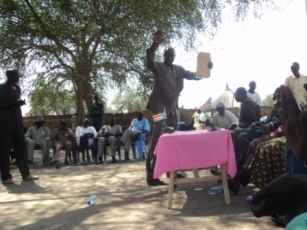Cattle herders richer than gov. officials Jonglei youth told
January 6, 2012 (PANYAGOOR) – Cattle keepers are richer than government employees and ought to work further to boost their wealth rather than relying entirely on government’s controlled resources, Jonglei authorities told gatherings of villagers Friday in Twic East county.
 The statement comes, days after cattle raids in Pibor county have displaced 100,000 people the UN say. The commissioner of the county claims that over 3,000 people have been killed.
The statement comes, days after cattle raids in Pibor county have displaced 100,000 people the UN say. The commissioner of the county claims that over 3,000 people have been killed.
There are more livestock in Jonglei state than human beings, according to experts.
Cattle in South Sudan indicate someones status and are used to pay bride prices, making them an integral part of the economy in the new country, which is one of the poorest in the world.
Speaking at a community meeting on Friday in Wanglei, the headquarters of Nyuak Payam [district] in Twic East county, the Jonglei governor’s advisor on youth affairs and development, Deng Alier, said a farmer keeping fifty cattle is “wealthier” than an advisor living on monthly salary.
“My salary includes my best cow, bull and feeding,” Alier said to applause of local chiefs and villagers who gathered at Wanglei to welcome their visitors.
Wanglei is the village where John Garang, the late leader of South Sudan’s ruling party (SPLM), was born.
Garang led the former rebel fighters’ from its inception in 1983 until the peace accord that ended two decades was signed in 2005, allowing South Sudan to secede through a referendum last year.
The SPLM’s former leader died just three weeks after becoming the President of the then government of Southern Sudan and the Vice President of the Sudan in accordance to the terms of peace deal.
The roads to Garang’s village, like other parts of Jonglei state, is damaged and only accessible during the dry season.
A distance of 60 kilometres takes three hours to cover. During the rainy season in 2011, the prices of items soared and a 50 kilograms bag of sorghum cost 350 South Sudan Pounds (SSP), according to traders. That price has dropped slightly to 250 SSP today.
Harvests were poor in 2011 due to flooding and small farm sizes, according to officials. Only a few squares metres around the huts in the village were being cultivated Sudan Tribune witnessed.
GARANG’S SCHOOL TO CLOSING OVER LACK OF FEEDING
Villagers in Wanglei say they are neglected but say they are in a better position than those who relocated to towns.
Insecurity has remained an issue in South Sudan since the peace accord with various rebel groups and cattle raiding making life difficult in rural areas.
Locals say that after almost seven year’s of self-government they are not seeing any economic or security dividends from South Sudan’s independence.
The government adviser said that many of the villagers were richer than him because of the number of cattle they had.
“I told a person, who has fifty cattle, wealthier than me but he never understood,” Deng Alier insisted.
Alier, comes from Twic East county was visiting the area with state members of parliament including women’s representative, Deu Aguil, who challenged residents to support their own children in schools.
However, there are reports that John Garang Secondary School is facing closure due to lack of food for students. Alier, asked parents, the village and the government to help keep the school open.
More than 70% of South Sudanese are illiterate due to the poor education system and decades of conflict.
MORE CATTLE, MORE PROBLEMS
According to the vice chancellor of John Garang Memorial University in Bor, Prof. Agrey A. Majok, there are more than one million cattle, goats and sheep in Jonglei state alone. Prof. Agrey said research indicated that even such as the Anyuak, not known for keeping cattle, have some cows, goats and sheep in Jonglei state.
People from the area will converge on Panyagoor, the headquarters of Twic East, on Saturday 7 January to formally recognise the reappointment of county commissioner Dau Akooi Jurkuch.
Other members of parliament to attend the weekend gathering are Amuor Kuol and Deng Aguer.
Pastoralist communities in Jonglei state keep cattle for food, marriage dowries and pride as well as savings given the country’s rudimentary banking system and the high rate of illiteracy.
Inter-tribal clashes are caused by competition over cattle ownership as well as competition for resources. The region is still awash with weapons from the north-south civil war.
Despite efforts to disarm civilians, small arms remain very common and a frequently used in cattle raiding and revenge attacks.
(ST)
